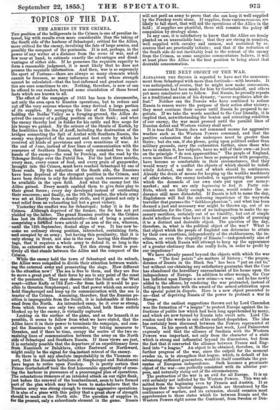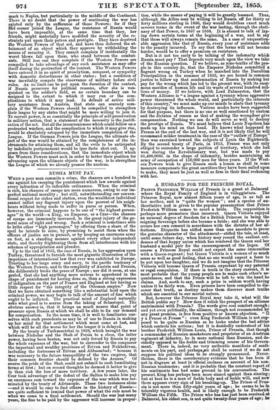THE NEXT OBJECT OF THE WAR.
ALEXANDER THE SECOND is reported to have met the announce- ment from Sebastopol with more than fortitude—with bravado. It was anticipated, of course, that he might now make concessions, as concessions had been made for him by Gortschakoff, and others yet more conclusive are to follow. But Russia, he proudly repeats as a traditional maxim of his dynasty, "never negotiates after de- feat." Neither can the Powers who have combined to reduce Russia to reason waive the purpose of their action after victory ; they must continue their course until Russia be prepared to ne- gotiate. If we take the words ascribed to the Czar literally, it is implied that, notwithstanding the beaten and retreating condition of our enemy, the war must proceed until the parallel lines of Russian defeat and Western victory shall meet. It is true that Russia does not command means for aggressive warfare such as the Western Powers command, and that the positive exhaustion that she undergoes must be greater than theirs ; but she can, if she please, going upon political rather than military grounds, carry the exhaustion further, since those who have to endure it, her subjects, have no will of their own—at least on the principle "de non apparentibus." The people of England, even more than of France, have been so pampered with prosperity, have become so comfortable in their circumstances, that they would weary of a conflict the objects of which should be indefi- nitely deferred, and the cost of which should be continuous. Already the drain of means for keeping up the warlike maohinery of other states, the enemy included, is aggravating the pressure which the demands of our own state put upon our money-- market ; and we are only beginning to feel it. Party con- flicts, which are likely enough to ensue, would render the en- durance still more distasteful. If Russia is left to name the day, Englishmen will feel the sickening impatience of the wayworn traveller that pursues the "faithless phantom"; and what has been deemed a just and necessary war might be thrown up, out of no consideration for the Czar, out of no indisposition to make the ne- cessary sacrifices, certainly out of no timidity, but out of simple doubt whether those who have it in band are capable of pursuing it to a distinct and desirable object. The question of the day, therefore, is, what is the political object of the war ? What is that object which the people of England can determine to attain by their own exertions, independently of the stubbornness, the in- ertness, or even the stupidity of Russia ?—independently also of wiles, with which Russia will attempt to keep up the appearance of a greater obstinacy than she really feels, in order to profit by our impatience ? We have already passed beyond the objects with which the war began. "The four points" are matters of history ; "the prepon- derance of Russia in the Black Sea" has been "put an end to," but without our obtaining any satisfactory guarantee that the Czar has abandoned the hereditary encroachment of his house upon the independence of Europe. In addition to other wrongs, the Czar has inflicted upon Europe a new crime—a war ; and he has newly added to the offence, by rendering the war protracted, instead of letting it terminate with the award of the armed arbitration upon the special point in dispute. Here is a new object presented to us—that of depriving Russia of the power to protract a war ii Europe.
One of the earliest suggestions thrown out by Lord Clarendon was the formation of" a league" to protect Europe against the in- fractions of public law which had been long apprehended by many, and which are now turned by Russia into overt acts. Lord Cla-
rendon used the words in one of his earliest despatches. The idea has certainly been discussed between the Powers represented at Vienna. In his speech at Melbourne last week, Lord Palmerston expressly said that the alliance of Sardinia with the Western Powers was important, not only from the character of a state which is strong and influential beyond its dimensions, but from the fact that it converted the alliance between France and Eng- land into "a league." An object to be obtained, therefore, in the further progress of the war, since the culprit for the moment evades us, is to strengthen that league, which, in default of his advancing sufficient guarantees, would in itself constitute the gua- rantee of European independence. Such becomes a proximate object of the war—one perfectly consistent with its ulterior pur- pose, and naturally rising out of the circumstances.
The protraction of the war is an evil for all Europe.. It is an evil certainly not inflicted by the Western Powers. This was ad- mitted from the beginning even by Prussia and Austria. It so happens that the ulterior dangers which are threatened by the continuance of warfare, and its extension, should occasion most apprehension to those states which lie between Russia and the Western Powers right across the Continent, from Sweden or Den-
mark to Naples, but particularly in the middle of the Continent. There is no doubt that the power of continuing the war has existed only by the sufferance of those Powers; for if they ad sooner joined the League, the resistance of Russia would have been impossible, at the same time that they, her friends, might materially have modified the severity of the re- straints put upon their patron and protegee. They have deprived the Western Powers of that aid, and have thus deferred the at- tainment of an object which they approve by withholding the means of securing it. They cannot complain if incidentally the worst blows fall upon them, who stand between the combat- ants. Still less can they complain if the Western Powers are compelled to take advantage of any such assistance as may offer itself during the protraction of the contest. The Western Powers have entered it in no spirit of proselytism, conquest, or sympathy with domestic disturbances in other states ; but a condition of war inevitably compels the observance of military before civil rules. As no limit can be put upon the duration of the contest, if Russia persevere for political reasons, after she is van- quished on the soldier's field, so no certain boundary can be assigned to the extent to which it may run or the com- plications to which it may lead. In default of active mili- tary assistance from Austria, that state can scarcely com- plain if the Western Powers should be compelled to strengthen their league by any states that might be more willing to join it. To recruit power, is so essentially the principle of self-preservation in military action, that a statement of the necessity is the justifi- cation of the act. But all the inconveniences which could follow on a protracted warfare, and the complication to which it may give rise, would be absolutely estopped by the immediate completion of the League. If the German Powers join the League, the ultimate ob- ject of the war would be attained by the completeness of the in- struments for attaining them, and all the evils to be anticipated by indefinite postponement would be ipso facto shut out. It ap- pears from these considerations, that the immediate object which the Western Powers must seek in order to better their position for advancing upon the ultimate objects of the war, is to strengthen the League of which we already possess the nucleus.



























 Previous page
Previous page